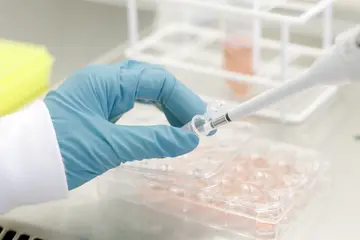Novozymes inaugurates world’s largest enzyme fermentation facility in China
Novozymes increases capabilities in bioethanol industry by expanding production in China. Since 2005 the Hongda facility in China has been continuously expanded and has more than tripled its headcount.
TAICANG, China (November 24, 2008) – Novozymes, the world leader in bioinnovation, today inaugurates the newest expansion of its Hongda production facility in Taicang, China, making it the largest enzyme fermentation facility in the world.
The facility, Suzhou Hongda Enzymes Co., is located in Taicang, Suzhou, Jiangsu Province, about 50 km north of Shanghai. The expanded capacity will primarily focus on products for the bioethanol industry, with the expansion signaling an investment in both bioethanol and the expanding Chinese market.
Peder Holk Nielsen, Executive Vice President of Novozymes A/S, says: “We believe bioethanol is a good example how biotechnology can make more from less, decoupling economic growth from the use of natural resources. As the world leader in bioinnovation, Novozymes is optimistic about the future of bioethanol and is dedicated to increasing our capabilities continuously in this field. The Suzhou facility is one of Novozymes’ strategic manufacturing locations, and this new expansion will enable us to accomplish more.”
Bioethanol is currently one of few viable renewable alternatives to gasoline and is capable of replacing gasoline partially or even totally for automobiles. The United States, Brazil, and China have defined clear targets and roadmaps for the development of the bioethanol industry. By 2010 China aims to more than double its bioethanol production to cover 5% of the total transport fuel used with a target of 3 million tons fuel ethanol.
More from less
Novozymes offers a highly efficient technology platform for sustainable production of bioethanol – getting more out of fewer resources. In 2010 Novozymes will have enzymes available on a large scale for production of second-generation bioethanol based on agricultural byproducts.
Qian Weidong, General Manager of Suzhou Hongda Enzymes Co., says that in the last several years the demand for enzymes for bioethanol production as well as other uses has increased rapidly around the world. Since 2005 Hongda has been expanded through a series of expansion projects and has now more than tripled in terms of headcount.
Taicang Mayor Xie Ming will attend the ribbon-cutting ceremony today. He notes that Novozymes is a leader not only within biotechnology but also on sustainable solutions and social responsibility. Despite the recent downturn in the global economy, Novozymes has increased its investment in Taicang, generating more revenue and jobs.


